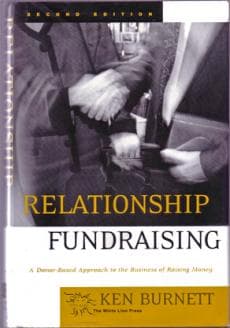How to grow income rapidly, at a reasonable cost, retaining donor loyalty along the way
- Written by
- Ken Burnett
- Added
- February 27, 2010
Book review

Relationship Fundraising: a donor-based approach to the business of raising money by Ken Burnett.
Reviewed for SOFII by Neil Sloggie.
In Relationship Fundraising, the classic read for all fundraisers, Ken Burnett takes us carefully through the fundamentals of good fundraising.
Ken reminds us that a unique relationship exists between donors and the causes they support, and shows us how to preserve and develop that relationship. He advocates maintaining the intimacy of the one-to-one relationship between donor and cause. ‘Fundraising is not about money. It’s about necessary work that urgently needs doing. It’s not about asking people to give – it’s about inspiring them to give. The money is just a means to an end.’
The keystone to enabling this relationship across large numbers of donors is management of the database. Ken advises how to use it creatively to make our communications less like impersonal junk mail and more like correspondence from a friend. ‘Donors know blatant commercialism when they see it. They may tolerate it but they don’t like it. They know when they’re being written to by a marketing machine. Consider what a difference it would make for the donor to receive a letter from someone they like. Your organisation should be that someone.’
‘We (fundraisers) have the best stories in the world to tell – real drama, urgent needs, touching human interest, life and death issues. Is a free plastic pen really the best inspiration we can offer to coax a potential new supporter?’
It costs more to recruit new donors than to retain existing donors, but that doesn’t stop nonprofits from spending much more on acquisition than on retention. In relationship fundraising, every communication is answered quickly, sincerely, and effectively, and every donation acknowledged. If donors know they are important, valued, and considered, they give more in the long term.
Relationship fundraising is a long-term activity but the increasing transience of fundraisers has created short-term thinking – if you’re only in a job for 18 months you need to make a quick impact. Short-term gain, however, can be long-term suicide. Many donors are losing faith in charities thanks to the impersonal mass-marketing approach to fundraising but, as Ken points out,‘when fundraising gets it right, people really are prepared to believe we can make the world a better place.’

Relationship Fundraising moves through the various areas of fundraising touching on techniques and broader issues, drawing on opinions and quotes from leading experts. Each level of the donor pyramid is covered. The pyramid itself becomes a trapezoid then a wedge, to usefully demonstrate elements of donor financial value. A chapter is devoted to bequest marketing which highlights its vast untapped potential and includes detailed advice about existing and new approaches, creativity, and even plagiarism. Observations about major gift fundraising include my favourite quote about the technique, ‘The really difficult part in big gift fundraising is not in getting people to give money, it is in getting people to ask.’
Experienced fundraisers learn over time an extremely useful list of things not to do. It is rare to see such a list included in a book. Relationship Fundraising, however, includes a chapter about avoiding common errors and pitfalls. Like the other chapters it includes confident direct opinions based solidly on the author’s vast experience, ‘The majority of nonprofit publications fail because they are dull.’
There is significant pressure today for fundraisers to grow income rapidly. This has led in many cases to rapidly increasing costs of fundraising, lower response rates, and heightened donor attrition. However, providing the cause actually needs the money, it is still possible to grow income rapidly, at a reasonable cost, retaining donor loyalty along the way. A few excellent fundraisers continually demonstrate this. It is my experience that these few excellent fundraisers are in every case following the principles set out so clearly in Relationship Fundraising.
Inspiring, enlightening, and thought provoking, Relationship Fundraising is packed with useful information for fundraisers at every level. It is one of the few serious full length textbooks interesting enough to be read at one stretch. It is also structured in such a way that it can be consulted for specific guidance on a particular subject, or at random for general good advice. The helpful action points at the end of each chapter can be used to sum-up as you are reading, or to revisit in future.
Sprinkled with unforgettable anecdotes such as the Calcutta beggars who shared what little they had with newly arrived refugees, Relationship Fundraising is a book that provides fundraisers with detailed technical guidance while never losing sight of the underlying fundamentals without which fundraising can never succeed.
© Neil Sloggie 2010.
About Neil Sloggie
 Neil Sloggie, author and founder of Fundraising Solutions, based in Queensland, Australia. Neil is one of the few truly international fundraising consultants roaming the planet.
Neil Sloggie, author and founder of Fundraising Solutions, based in Queensland, Australia. Neil is one of the few truly international fundraising consultants roaming the planet.


















